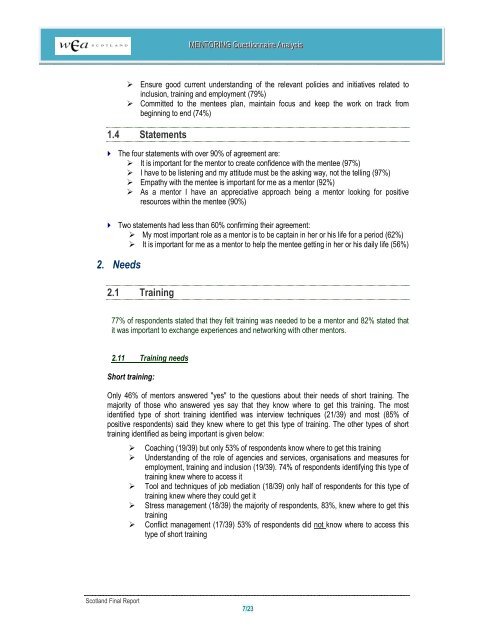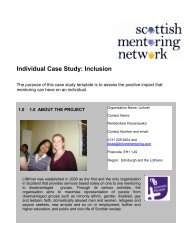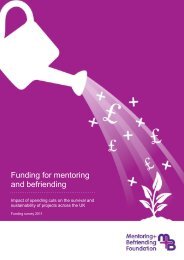MENTORING QUESTIONNAIRE EVALUATION REPORT Answers ...
MENTORING QUESTIONNAIRE EVALUATION REPORT Answers ...
MENTORING QUESTIONNAIRE EVALUATION REPORT Answers ...
Create successful ePaper yourself
Turn your PDF publications into a flip-book with our unique Google optimized e-Paper software.
MEENNTTORRI IINNG Quueesst tti iioonnnnaai iir ree AAnnaal llyyssi iiss<br />
Ensure good current understanding of the relevant policies and initiatives related to<br />
inclusion, training and employment (79%)<br />
Committed to the mentees plan, maintain focus and keep the work on track from<br />
beginning to end (74%)<br />
1.4 Statements<br />
The four statements with over 90% of agreement are:<br />
It is important for the mentor to create confidence with the mentee (97%)<br />
I have to be listening and my attitude must be the asking way, not the telling (97%)<br />
Empathy with the mentee is important for me as a mentor (92%)<br />
As a mentor I have an appreciative approach being a mentor looking for positive<br />
resources within the mentee (90%)<br />
Two statements had less than 60% confirming their agreement:<br />
My most important role as a mentor is to be captain in her or his life for a period (62%)<br />
It is important for me as a mentor to help the mentee getting in her or his daily life (56%)<br />
2. Needs<br />
2.1 Training<br />
77% of respondents stated that they felt training was needed to be a mentor and 82% stated that<br />
it was important to exchange experiences and networking with other mentors.<br />
2.11 Training needs<br />
Short training:<br />
Only 46% of mentors answered "yes" to the questions about their needs of short training. The<br />
majority of those who answered yes say that they know where to get this training. The most<br />
identified type of short training identified was interview techniques (21/39) and most (85% of<br />
positive respondents) said they knew where to get this type of training. The other types of short<br />
training identified as being important is given below:<br />
<br />
<br />
<br />
<br />
<br />
Coaching (19/39) but only 53% of respondents know where to get this training<br />
Understanding of the role of agencies and services, organisations and measures for<br />
employment, training and inclusion (19/39). 74% of respondents identifying this type of<br />
training knew where to access it<br />
Tool and techniques of job mediation (18/39) only half of respondents for this type of<br />
training knew where they could get it<br />
Stress management (18/39) the majority of respondents, 83%, knew where to get this<br />
training<br />
Conflict management (17/39) 53% of respondents did not know where to access this<br />
type of short training<br />
Scotland Final Report<br />
7/23






